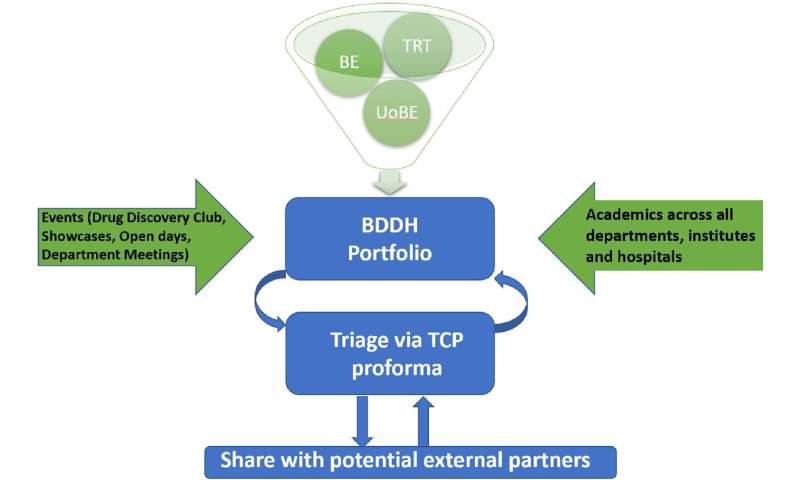How the Birmingham Drug Discovery Hub created an investment-ready 'drug library'

A novel approach to drug discovery is enabling University of Birmingham researchers to overcome the "valley of death," where projects fail due to the funding gap between original research and commercial investment.
The approach, detailed in a feature published in the April issue of Drug Discovery Today, has attracted more than £4m in industry funding, grants and industry awards, on the back of just £0.2m investment from the University's Dynamic Investment Fund (DIF).
The Birmingham Drug Discovery Hub was set up following a review that showed despite significant expertise in fields necessary for drug discovery, including a strong clinical team and two world-leading clinical trials centers, there were some excellent examples of translation but these were sporadic.
Realization of this untapped potential became a priority for the University, and a Chair of Drug Discovery was appointed with the mission of leading and integrating drug discovery across campus. Professor Ruth Roberts, who has significant experience of drug development in industry, took on the academic lead role.
The approach defined by the BDDH had two key elements: the evaluation and management of projects by experts in drug discovery and development, and targeted resources to create a diverse, de-risked portfolio of projects that are ready for investment.
The portfolio covers projects from every part of the University which are fed into the BDDH pipeline following identification by BDDH, University of Birmingham Enterprise, the University's Business Engagement & Research Impact and Translational Research teams, as well as from outreach events and directly from academics.
The initial triage of projects is critical. A bespoke team is assembled for each project, involving university as well as external subject matter experts. This triage is followed by a systematic 'target-chemistry-patient' evaluation, which identifies key risks and mitigation measures, and flushes out gaps in the data that are required before a project can enter clinical trials.
These gaps and concerns are then addressed with small, enabling investments (£5,000–£50,000) from the DIF, to fund work such as computational modeling, early chemistry or evaluation of unwanted safety risks. Academics can also bid for time from a medicinal chemistry Research Fellow, employed by the BDDH as a central resource to overcome the dependency on someone 'knowing someone else' within the university who is willing to help out.
Professor Roberts said, "The BDDH model tackles, head-on, the biggest challenges that arise in academic drug discovery: lack of funding between basic research and investment-ready research; lack of expertise in universities to assess value and identify data gaps; and the issue of scale in university research, which often does not meet the critical mass of expertise needed for clinical translation."
David Coleman, CEO of University of Birmingham Enterprise, said, "Drug discovery is an important area of research for Birmingham, yet the ideas and innovations that arise can be difficult to take forward, not least because of the limited investment that is available in a sector which is highly capital intensive.
"The BDDH directs available resource in the most targetted way to de-risk opportunities for commercial investors or licensees, and has created an impressive portfolio that includes novel targets, small molecules, and approaches such as immune-based targeting for inflammatory diseases."
Further examples of current BDDH projects are listed here. The BDDH also manages the Haworth Compound Collection, a curated collection of compounds synthesized in Birmingham, which display drug-like properties.
The Haworth Collection includes a physical collection of more than 600 compounds and a much larger virtual collection assembled during lockdown by mining 25 years' worth of Ph.D. theses for suitable compounds.
More information:
Academic drug discovery: Challenges and opportunities is published in Drug Discovery Today, Volume 29, Number 4, April 2024, and is available at doi.org/10.1016/j.drudis.2024.103918
For media information contact Ruth Ashton, University of Birmingham Enterprise, email: r.c.ashton@bham.ac.uk
The University of Birmingham is ranked amongst the world's top 100 institutions. Its work brings people from across the world to Birmingham, including researchers, teachers and more than 8,000 international students from over 150 countries.
University of Birmingham Enterprise helps students and researchers turn their ideas into new services, products and enterprises that meet real-world needs. We also provide incubation and bio-incubation, support innovators and entrepreneurs with mentoring, advice and training, and manage the University's Academic Consultancy Service. Follow us on LinkedIn and Twitter.
Provided by University of Birmingham